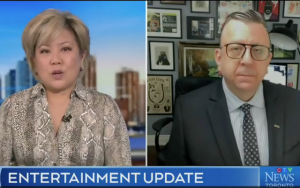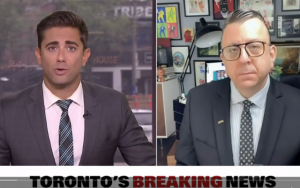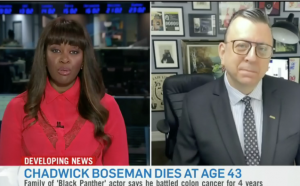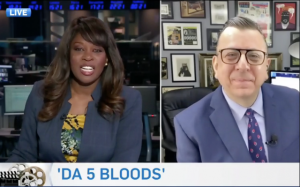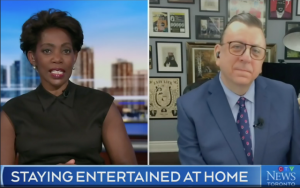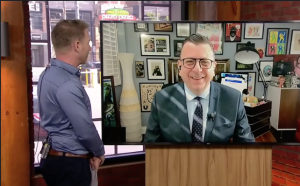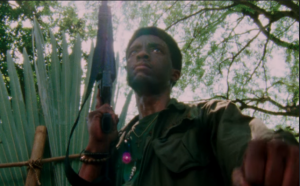2020: remembering THE BEST MOVIES OF A YEAR we’d rather forget!
 This year sucked. But you already know that. Every day felt like Groundhog Day, a repeat of bad news from the day before.
This year sucked. But you already know that. Every day felt like Groundhog Day, a repeat of bad news from the day before.
I know every year enters itself into the history books one way or another but I have the feeling entire encyclopedias will be written about the events of this annus horribilis.
It has been exhausting but as we near the end of this tumultuous year I’m trying to feel optimistic. I think of my grandmother who lived through both the Halifax Explosion and the 1918 Influenza Pandemic. She’s been gone for many years now, so I can’t ask her, but I think it was her optimistic spirit that got her through the rough spots. It was her secret power. This new year my resolution is to use optimism as antidote to the loneliness and cynicism 2020 has inspired.
With that in mind I am hopeful that what many in the arts experienced during the pandemic lockdown will lead to exciting new ideas for movies, shows, and music. Creative minds never stop working so somewhere innovative television shows are being written, movies that don’t have a number in the title are being conceived, and songs that will reflect the times we live in right now are being recorded. I am excited and optimistic for what will come out of our collective pandemic experience.
We may not be feeling great right now, but I’m counting on us to rediscover our optimism and let our hopes, not our hurts, shape the future.
One of the things that helped us through the long days and nights of 2020 was the stream of interesting movies that found a way to be seen despite theatres being closed. This is my list of 21 must sees for 2020, but keep in mind that in keeping with the weird year, this list is kinda weird as well. Several titles will not be available until 2021 but qualify for includion because they played at film festivals and are eligible for Academy Awards this year.
I didn’t make a list of the worst of the year because, frankly, there’s enough bad in the world right now.
So, without further ado, here, in alphabetical order, is my list of the Best Movies of 2020.
 THE ASSISTANT: Based on hundreds of interviews with real-life assistants, this is more than just a movie, it is a timely document of abuse of power and complicity. As the assistant to a high-flying New York movie mogul, Jane (Julia Garner) floats around the office, silently collating papers, cleaning up mysterious stains from her boss’s casting couch—“Never sit on the couch,” her co-workers joke—wordlessly doing the jobs nobody else will do. An aspiring filmmaker with hopes of one day producing her own movies she sees the job, low level as it is, as a stepping stone. “The Assistant” is anchored by a subtle yet devastating performance from Garner. The hard-edged bluster she brings to her character on “Ozark” is missing, replaced by anxiety as she realizes the extent of the exploitation happening around her. It’s quiet, restrained and heartbreaking to watch how she is beaten down.
THE ASSISTANT: Based on hundreds of interviews with real-life assistants, this is more than just a movie, it is a timely document of abuse of power and complicity. As the assistant to a high-flying New York movie mogul, Jane (Julia Garner) floats around the office, silently collating papers, cleaning up mysterious stains from her boss’s casting couch—“Never sit on the couch,” her co-workers joke—wordlessly doing the jobs nobody else will do. An aspiring filmmaker with hopes of one day producing her own movies she sees the job, low level as it is, as a stepping stone. “The Assistant” is anchored by a subtle yet devastating performance from Garner. The hard-edged bluster she brings to her character on “Ozark” is missing, replaced by anxiety as she realizes the extent of the exploitation happening around her. It’s quiet, restrained and heartbreaking to watch how she is beaten down.
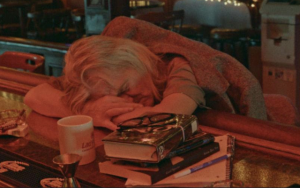 BLOODY NOSE, EMPTY POCKETS: Like a Cassavetes film, “Bloody Nose, Empty Pockets” is an experimental combination of documentary and fiction that favours characters and a sense of place over traditional story-telling. It’s rough and tumble, like the people it portrays. The rough-hewn sound and the hand held camera work creates the feel of having been sitting at the bar from morning to night. Conversations overlap, the images blur as a growing sense of melancholy settles over the film in its closing minutes.
BLOODY NOSE, EMPTY POCKETS: Like a Cassavetes film, “Bloody Nose, Empty Pockets” is an experimental combination of documentary and fiction that favours characters and a sense of place over traditional story-telling. It’s rough and tumble, like the people it portrays. The rough-hewn sound and the hand held camera work creates the feel of having been sitting at the bar from morning to night. Conversations overlap, the images blur as a growing sense of melancholy settles over the film in its closing minutes.
 THE BOOKSELLERS: Author Maurice Sendak said, “There’s so much more to a book than just the reading.” A documentary, “The Booksellers,” is a Valentine to books and the people who understand that the printed word is just the beginning of our relationship to a book. We also learn how collecting has changed. “Collecting is about the hunt,” says one seller. “The internet has killed the hunt.” Another mentions how the internet changed the way collectors speak about what is rare and what is not.
THE BOOKSELLERS: Author Maurice Sendak said, “There’s so much more to a book than just the reading.” A documentary, “The Booksellers,” is a Valentine to books and the people who understand that the printed word is just the beginning of our relationship to a book. We also learn how collecting has changed. “Collecting is about the hunt,” says one seller. “The internet has killed the hunt.” Another mentions how the internet changed the way collectors speak about what is rare and what is not.
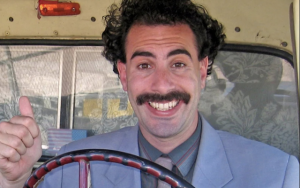 BORAT SUBSEQUENT MOVIEFILM: The action begins with Borat (Sacha Baron Cohen) released from prison, cleaned up and once again sent to “Yankeeland” on a mission. His job is to earn the respect of Donald Trump by giving the gift of a monkey to “Vice Premier Pence.” When Borat arrives though, the monkey is gone from its packing crate. In its place is daughter Tutar (Maria Bakalova). “My daughter is here,” Borat reports back to Kazakhstan. “Should I give her as a gift?” Thus, begins the journey that will see Borat and Tutar meet with a real-life cast of characters that offers cringe worthy insight into Western culture. Just like the year it is being released “Borat Subsequent MovieFilm” is a chaotic, uncomfortable experience. It will make you laugh but is geared to also make you think.
BORAT SUBSEQUENT MOVIEFILM: The action begins with Borat (Sacha Baron Cohen) released from prison, cleaned up and once again sent to “Yankeeland” on a mission. His job is to earn the respect of Donald Trump by giving the gift of a monkey to “Vice Premier Pence.” When Borat arrives though, the monkey is gone from its packing crate. In its place is daughter Tutar (Maria Bakalova). “My daughter is here,” Borat reports back to Kazakhstan. “Should I give her as a gift?” Thus, begins the journey that will see Borat and Tutar meet with a real-life cast of characters that offers cringe worthy insight into Western culture. Just like the year it is being released “Borat Subsequent MovieFilm” is a chaotic, uncomfortable experience. It will make you laugh but is geared to also make you think.
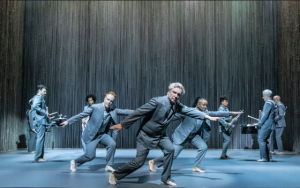 DAVID BYRNE’S AMERICAN UTOPIA: Filmed during the show’s 2019 Broadway run at New York’s Hudson Theatre, the film captures the cerebral but exuberant concert that features Byrne, alongside eleven musicians, all dressed alike in skinny grey suits, and all unfettered from amplifiers and the like. With wireless guitars, keyboards and all manner of other instruments on an empty stage with no other gear or risers, Byrne and Company fill the space with intricate choreography, eclectic songs, new and old, and an uplifting social message of fellowship and faith in humanity. Byrne’s enthusiasm is infectious and Spike Lee, using a combination of you-are-there camera angles, including a beautiful overhead shot, captures the jubilant postmodernist performance in glorious fashion. Highlights, and there are many, include “Everybody’s Coming to My House,” Byrne’s ode to inclusivity and a potent cover of “Hell You Talmbout,” Janelle Monae’s protest song about police brutality. The latter song, a call and response featuring names the names of African Americans killed by police, is given extra clout by the addition of Spike Lee’s graphics that update the names mentioned in the song to include dozens of others. It is a powerful moment and an urgent call for change.
DAVID BYRNE’S AMERICAN UTOPIA: Filmed during the show’s 2019 Broadway run at New York’s Hudson Theatre, the film captures the cerebral but exuberant concert that features Byrne, alongside eleven musicians, all dressed alike in skinny grey suits, and all unfettered from amplifiers and the like. With wireless guitars, keyboards and all manner of other instruments on an empty stage with no other gear or risers, Byrne and Company fill the space with intricate choreography, eclectic songs, new and old, and an uplifting social message of fellowship and faith in humanity. Byrne’s enthusiasm is infectious and Spike Lee, using a combination of you-are-there camera angles, including a beautiful overhead shot, captures the jubilant postmodernist performance in glorious fashion. Highlights, and there are many, include “Everybody’s Coming to My House,” Byrne’s ode to inclusivity and a potent cover of “Hell You Talmbout,” Janelle Monae’s protest song about police brutality. The latter song, a call and response featuring names the names of African Americans killed by police, is given extra clout by the addition of Spike Lee’s graphics that update the names mentioned in the song to include dozens of others. It is a powerful moment and an urgent call for change.
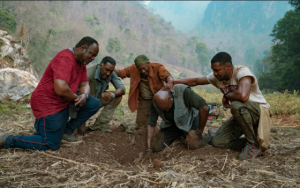 DA 5 BLOODS: Spike Lee movies are like onions. Peel off a layer and there’s a new one beneath. Take that off and another reveals itself. His latest, “Da 5 Bloods,” now streaming on Netflix, is even more multi-faceted than usual. The director calls it a “gumbo,” a rich stew of varied ingredients. It’s a two-and-half-hour Vietnam War legacy film featuring a Trump supporter in a leading role. It’s a searing look at how African American soldiers fought in a war for a country that didn’t support them and it’s an adventure film, à la “The Treasure of the Sierra Madre” with action scenes and even buried treasure.
DA 5 BLOODS: Spike Lee movies are like onions. Peel off a layer and there’s a new one beneath. Take that off and another reveals itself. His latest, “Da 5 Bloods,” now streaming on Netflix, is even more multi-faceted than usual. The director calls it a “gumbo,” a rich stew of varied ingredients. It’s a two-and-half-hour Vietnam War legacy film featuring a Trump supporter in a leading role. It’s a searing look at how African American soldiers fought in a war for a country that didn’t support them and it’s an adventure film, à la “The Treasure of the Sierra Madre” with action scenes and even buried treasure.
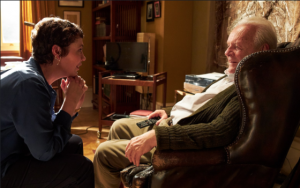 THE FATHER: This is a family drama about taking care of a loved one with dementia that manipulates reality to tell the story from two very different points of view, the caretakers and the patient. “The Father” is a sensitively made portrait of a failing mind anchored by a towering, emotional performance from Anthony Hopkins. The Oscar winner has made a career playing characters etched in ice; cool and collected. Here we see the vulnerable side, the lion in winter slowly losing himself to the vagaries of disease. It’s a tour de force of a performance that is often a difficult watch but his control of the character, particularly in the film’s final heartbreaking moments, as Anthony’s real and illusory lives intersect, is astonishing.
THE FATHER: This is a family drama about taking care of a loved one with dementia that manipulates reality to tell the story from two very different points of view, the caretakers and the patient. “The Father” is a sensitively made portrait of a failing mind anchored by a towering, emotional performance from Anthony Hopkins. The Oscar winner has made a career playing characters etched in ice; cool and collected. Here we see the vulnerable side, the lion in winter slowly losing himself to the vagaries of disease. It’s a tour de force of a performance that is often a difficult watch but his control of the character, particularly in the film’s final heartbreaking moments, as Anthony’s real and illusory lives intersect, is astonishing.
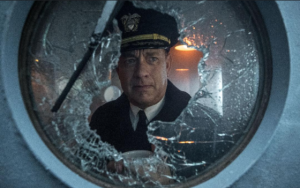 GREYHOUND: Set during the onset of the United States’ involvement in World War II, Tom Hanks plays Commander Ernest Krause, a stoic sailor on his first command. His mission is to lead an international convoy of 37 Allied ships across the North Atlantic with a wolfpack of German U-boats in hot pursuit. Running out of depth charges and fuel, the convoy needs air cover which is hours away. In a breathless ninety minutes director Aaron Schneider ratchets up tension, creating an old-fashioned action movie that mines a life and death situation for real cinematic thrills.
GREYHOUND: Set during the onset of the United States’ involvement in World War II, Tom Hanks plays Commander Ernest Krause, a stoic sailor on his first command. His mission is to lead an international convoy of 37 Allied ships across the North Atlantic with a wolfpack of German U-boats in hot pursuit. Running out of depth charges and fuel, the convoy needs air cover which is hours away. In a breathless ninety minutes director Aaron Schneider ratchets up tension, creating an old-fashioned action movie that mines a life and death situation for real cinematic thrills.
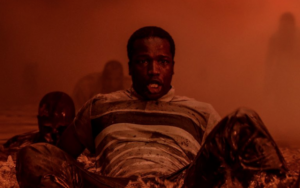 HIS HOUSE: Bol (Sope Dirisu) and Rial (Wunmi Mosaku) are refugees from war torn South Sudan. Their journey to freedom is fraught. They’re crammed into busses and pick-up trucks, then loaded on to a leaky boat in rough waters. At sea they lose their young daughter who drowns when the boat flips. They survive and land in an English detention centre. While they wait on their claim of asylum, they’re moved into a dilapidated community housing. “You will be sent to a home of our choosing,” they are told. “You must reside at this address. You must not move from this address. This is your home now.” The filthy fixer-upper (to put it mildly) has holes in the walls, garbage piled out front and an evil secret, possibly a spirit from their former country. What follows is a classic haunted house film with a deep subtext that breathes new life into the genre’s desiccated old lungs. Set against a background of cultural displacement, survivors’ guilt, and the psychological wounds of a life spent in trauma, “His House” is no “Amityville Horror.” Sure, strange things happen in the home. Voices come from behind the drywall, a spirit appears and dreams manifest themselves in the most horrific of ways, but the context is different.
HIS HOUSE: Bol (Sope Dirisu) and Rial (Wunmi Mosaku) are refugees from war torn South Sudan. Their journey to freedom is fraught. They’re crammed into busses and pick-up trucks, then loaded on to a leaky boat in rough waters. At sea they lose their young daughter who drowns when the boat flips. They survive and land in an English detention centre. While they wait on their claim of asylum, they’re moved into a dilapidated community housing. “You will be sent to a home of our choosing,” they are told. “You must reside at this address. You must not move from this address. This is your home now.” The filthy fixer-upper (to put it mildly) has holes in the walls, garbage piled out front and an evil secret, possibly a spirit from their former country. What follows is a classic haunted house film with a deep subtext that breathes new life into the genre’s desiccated old lungs. Set against a background of cultural displacement, survivors’ guilt, and the psychological wounds of a life spent in trauma, “His House” is no “Amityville Horror.” Sure, strange things happen in the home. Voices come from behind the drywall, a spirit appears and dreams manifest themselves in the most horrific of ways, but the context is different.
 HONEY BOY: Written as an exercise while in rehab, Shia LeBeouf’s script for “Honey Boy” is a biographical piece about growing up as a child actor with an addicted former rodeo clown and Vietnam Vet father who didn’t always have his child actor son’s best interest in mind. By turns touching and bleak, tender and therapeutic, the film is a testament to art as a tonic to heal wounds. “Honey Boy” is about a terrible relationship but it isn’t an angry movie. LeBeouf’s script and the direction of Alma Har’el, capture a heartbreaking melancholy of a father who never recovered from having his dreams shattered. The young son may say “The only thing my father gave me of any value was pain,” but there is empathy in the words and in LeBeouf’s portrayal of James. He’s abusive, drunk, prone to violence, but he’s broken and knows no other path. It’s not an excuse, simply an observation. “Stop bringing up the past,” James tells Otis. “I can’t get out from under it.”
HONEY BOY: Written as an exercise while in rehab, Shia LeBeouf’s script for “Honey Boy” is a biographical piece about growing up as a child actor with an addicted former rodeo clown and Vietnam Vet father who didn’t always have his child actor son’s best interest in mind. By turns touching and bleak, tender and therapeutic, the film is a testament to art as a tonic to heal wounds. “Honey Boy” is about a terrible relationship but it isn’t an angry movie. LeBeouf’s script and the direction of Alma Har’el, capture a heartbreaking melancholy of a father who never recovered from having his dreams shattered. The young son may say “The only thing my father gave me of any value was pain,” but there is empathy in the words and in LeBeouf’s portrayal of James. He’s abusive, drunk, prone to violence, but he’s broken and knows no other path. It’s not an excuse, simply an observation. “Stop bringing up the past,” James tells Otis. “I can’t get out from under it.”
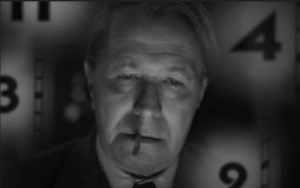 MANK: “Mank,” directed by David Fincher, isn’t a making-of story about “Citizen Kane,” but more the unmaking of its screenwriter Herman J. Mankiewicz (Gary Oldman). Shot in luscious black and white, the story is told on a broken time line, à la “Citizen Kane,” as the action springs back and forth between the past and the present. Oldman staggers through the movie causing a scene at a costume dinner party at Hearst’s San Simeon estate and platonically courting his friend, movie star Marion Davies (Amanda Seyfried), who also happens to be Hearst’s mistress. He’s poured into bed by his long-suffering wife (Tuppence Middleton) and goes to war with Louis B. Mayer (Arliss Howard), professionally and politically– “If I ever go to the electric chair,” he says of Mayer, “I’d like him to be sitting in my lap.”—while ignoring potentially career saving advice from his brother (Tom Pelphrey). Each vignette adds DNA to the portrait, as his disillusionment with Hollywood, politics and power grows by the moment. Oldman is suitably ragged and ribald, bringing a lesser-known historical figure to bawdy life but it is Seyfried who almost steals the show. As Marion Davies he is the epitome of old Hollywood glamour but behind the sequins and wide eyes is a deep well of intelligence that Seyfried slyly imbues into her character. When she and Oldman are side-by-side, the movie sings.
MANK: “Mank,” directed by David Fincher, isn’t a making-of story about “Citizen Kane,” but more the unmaking of its screenwriter Herman J. Mankiewicz (Gary Oldman). Shot in luscious black and white, the story is told on a broken time line, à la “Citizen Kane,” as the action springs back and forth between the past and the present. Oldman staggers through the movie causing a scene at a costume dinner party at Hearst’s San Simeon estate and platonically courting his friend, movie star Marion Davies (Amanda Seyfried), who also happens to be Hearst’s mistress. He’s poured into bed by his long-suffering wife (Tuppence Middleton) and goes to war with Louis B. Mayer (Arliss Howard), professionally and politically– “If I ever go to the electric chair,” he says of Mayer, “I’d like him to be sitting in my lap.”—while ignoring potentially career saving advice from his brother (Tom Pelphrey). Each vignette adds DNA to the portrait, as his disillusionment with Hollywood, politics and power grows by the moment. Oldman is suitably ragged and ribald, bringing a lesser-known historical figure to bawdy life but it is Seyfried who almost steals the show. As Marion Davies he is the epitome of old Hollywood glamour but behind the sequins and wide eyes is a deep well of intelligence that Seyfried slyly imbues into her character. When she and Oldman are side-by-side, the movie sings.
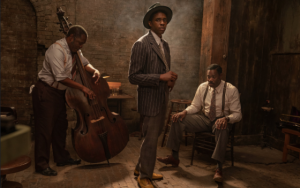 MA RAINEY’S BLACK BOTTOM: Set in the roaring 1920’s Chicago, Viola Davis plays the titular character, a real-life musical trailblazer known as “Mother of the Blues.” On a sweltering day in a dank basement recording studio, the band, pianist Toledo (Glynn Turman), trombonist Cutler (Colman Domingo), and string bassist Slow Drag (Michael Potts) and Levee (Chadwick Boseman in a career high performance), rehearse as they wait for the fashionably late Ma to arrive. The heat, claustrophobia, frayed egos and twitchy Levee’s insistence on changing tried-and-true musical arrangements, fuel a war of words and wills as they attempt to put Ma’s signature “Black Bottom” song to disc. Although set in the 1920s and written in the 1980s, the ideas and the anger in “Ma Rainey’s Black Bottom” feels of the moment and indispensable. The dialogue crackles and the context resonates because Wilson’s source material has not only stood the test of time, but transcends it.
MA RAINEY’S BLACK BOTTOM: Set in the roaring 1920’s Chicago, Viola Davis plays the titular character, a real-life musical trailblazer known as “Mother of the Blues.” On a sweltering day in a dank basement recording studio, the band, pianist Toledo (Glynn Turman), trombonist Cutler (Colman Domingo), and string bassist Slow Drag (Michael Potts) and Levee (Chadwick Boseman in a career high performance), rehearse as they wait for the fashionably late Ma to arrive. The heat, claustrophobia, frayed egos and twitchy Levee’s insistence on changing tried-and-true musical arrangements, fuel a war of words and wills as they attempt to put Ma’s signature “Black Bottom” song to disc. Although set in the 1920s and written in the 1980s, the ideas and the anger in “Ma Rainey’s Black Bottom” feels of the moment and indispensable. The dialogue crackles and the context resonates because Wilson’s source material has not only stood the test of time, but transcends it.
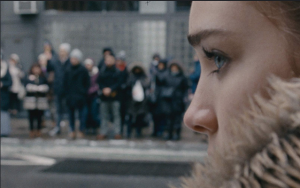 NEVER RARELY SOMETIMES ALWAYS: At the NYC clinic seventeen-year-old Autumn (Sidney Flanigan) is asked to answer a series of questions like, “Has anyone made her have sex against her will?” regarding her sexual history and partners. Each is answered with one word, never, rarely, sometimes or always. As the questionnaire continues the scene becomes fraught with meaning as each answer brings up a wellspring of feelings. “Never Really Sometimes Always” was billed as an abortion drama but is really a story of class, gender and the bond between two young women. It is a quiet, keenly observed movie that avoids the pitfalls of pathos to present a story on the topic of bodily autonomy. Stark and naturalistic, it relies on subtlety and nuance to comment on a topic that is frequently the subject of histrionics. Director Eliza Hittman allows Autumn’s anxiety to be the focus of the story, giving us a powerful, nonjudgement window into the inner workings of her decision. The title is key to one of film’s most riveting scenes of emotional honesty.
NEVER RARELY SOMETIMES ALWAYS: At the NYC clinic seventeen-year-old Autumn (Sidney Flanigan) is asked to answer a series of questions like, “Has anyone made her have sex against her will?” regarding her sexual history and partners. Each is answered with one word, never, rarely, sometimes or always. As the questionnaire continues the scene becomes fraught with meaning as each answer brings up a wellspring of feelings. “Never Really Sometimes Always” was billed as an abortion drama but is really a story of class, gender and the bond between two young women. It is a quiet, keenly observed movie that avoids the pitfalls of pathos to present a story on the topic of bodily autonomy. Stark and naturalistic, it relies on subtlety and nuance to comment on a topic that is frequently the subject of histrionics. Director Eliza Hittman allows Autumn’s anxiety to be the focus of the story, giving us a powerful, nonjudgement window into the inner workings of her decision. The title is key to one of film’s most riveting scenes of emotional honesty.
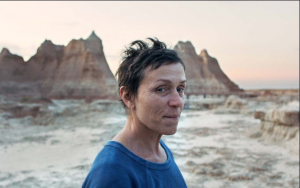 NOMADLAND: A blend of fiction and nonfiction, “Nomadland,” the melancholy Frances McDormand drama, is a timely story of a woman who learns to adapt and survive after losing everything she held dear. At times “Nomadland” feels like a documentary. Director Chloé Zhao and McDormand have created a beautiful character study about the flipside of the American Dream. As Fern makes her way from gig to gig Zhao decorates the screen with eye-popping visuals courtesy of Joshua James Richards’s cinematography of the landscapes that form the backdrop to Fern’s journey. The story is poetic but never cloying and always reaching for the horizon.
NOMADLAND: A blend of fiction and nonfiction, “Nomadland,” the melancholy Frances McDormand drama, is a timely story of a woman who learns to adapt and survive after losing everything she held dear. At times “Nomadland” feels like a documentary. Director Chloé Zhao and McDormand have created a beautiful character study about the flipside of the American Dream. As Fern makes her way from gig to gig Zhao decorates the screen with eye-popping visuals courtesy of Joshua James Richards’s cinematography of the landscapes that form the backdrop to Fern’s journey. The story is poetic but never cloying and always reaching for the horizon.
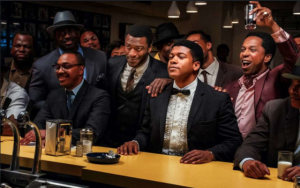 ONE NIGHT IN MIAMI: We’ll never know exactly what was said between Cassius Clay, Nation of Islam leader Malcolm X, soul singer Sam Cooke, and football superstar Jim Brown behind closed doors in a Miami hotel room on February 25, 1964, but THIS film by Oscar winner Regina King in her directorial debut, offers up a fascinating what-if scenario. It’s a snapshot of the cultural importance of this quartet; a history lesson made even more potent in the era of Black Lives Matter. “Power,” says Clay, “is a world where it’s safe to be ourselves.”
ONE NIGHT IN MIAMI: We’ll never know exactly what was said between Cassius Clay, Nation of Islam leader Malcolm X, soul singer Sam Cooke, and football superstar Jim Brown behind closed doors in a Miami hotel room on February 25, 1964, but THIS film by Oscar winner Regina King in her directorial debut, offers up a fascinating what-if scenario. It’s a snapshot of the cultural importance of this quartet; a history lesson made even more potent in the era of Black Lives Matter. “Power,” says Clay, “is a world where it’s safe to be ourselves.”
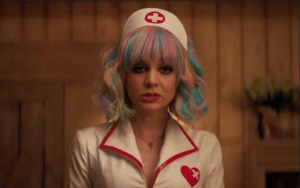 PROMISING YOUNG WOMAN: It would be easy to suggest that “Promising Young Woman,” a new drama starring Carey Mulligan, is simply a “Falling Down” for the #MeToo era but it is much more than that. It has elements of that but it is also an audacious look at rape culture and male privilege that weaves dark humour and revenge into the ragged fabric of its story. One of the pleasures of “Promising Young Woman” is in its ability to surprise and shock with the story’s twists and turns. There is a lot in play here. The action here is fueled by Cassie’s (Mulligan) trauma but writer-director Emerald Fennell keeps the action off kilter with the introduction of dark satire, revenge, an exploration of toxic masculinity and even some rom com-esque scenes. The culmination of all these disparate components is a film with a strange tone but a clear-cut point of view. It’s social commentary as art and it works.
PROMISING YOUNG WOMAN: It would be easy to suggest that “Promising Young Woman,” a new drama starring Carey Mulligan, is simply a “Falling Down” for the #MeToo era but it is much more than that. It has elements of that but it is also an audacious look at rape culture and male privilege that weaves dark humour and revenge into the ragged fabric of its story. One of the pleasures of “Promising Young Woman” is in its ability to surprise and shock with the story’s twists and turns. There is a lot in play here. The action here is fueled by Cassie’s (Mulligan) trauma but writer-director Emerald Fennell keeps the action off kilter with the introduction of dark satire, revenge, an exploration of toxic masculinity and even some rom com-esque scenes. The culmination of all these disparate components is a film with a strange tone but a clear-cut point of view. It’s social commentary as art and it works.
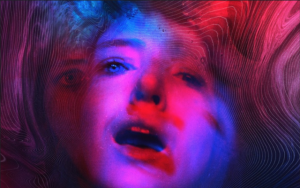 SHE DIES TOMORROW: A surreal horror film, “She Dies Tomorrow” is a timely and unsettling story where the fear of death is passed from person to person like a virus. Fittingly the film has a hallucinogenic, experimental style. Throbbing, flashing swaths of colour fill the screen as the virus—or whatever it is—attaches itself to a new host. It’s trippy, slightly psychedelic and may test the patience of less adventurous viewers but in a time where COVID-19 has spread worldwide, bringing with it angst and unease, a movie that examines human behavior in the face of transmittable trauma is, perhaps, a nightmarish artistic inevitability.
SHE DIES TOMORROW: A surreal horror film, “She Dies Tomorrow” is a timely and unsettling story where the fear of death is passed from person to person like a virus. Fittingly the film has a hallucinogenic, experimental style. Throbbing, flashing swaths of colour fill the screen as the virus—or whatever it is—attaches itself to a new host. It’s trippy, slightly psychedelic and may test the patience of less adventurous viewers but in a time where COVID-19 has spread worldwide, bringing with it angst and unease, a movie that examines human behavior in the face of transmittable trauma is, perhaps, a nightmarish artistic inevitability.
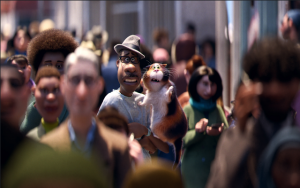 SOUL: Like the jazz music that dots the score, “Soul” is free-form, inventive and sometimes just a little hard to understand. It’s an existential riff on a buddy comedy. Or maybe “Freaky Friday” as directed by Frank Capra. Either way, it has a lot on its mind although it never digs too deep. Ultimately the ethereal action boils down to a simple message of mindfulness, of being aware of the simple joy life offers. Despite typical cartoony touches, like a toffee-nosed accountant soul and some feline slapstick, “Soul” is a life-affirming, poignant look at what it means to be human.
SOUL: Like the jazz music that dots the score, “Soul” is free-form, inventive and sometimes just a little hard to understand. It’s an existential riff on a buddy comedy. Or maybe “Freaky Friday” as directed by Frank Capra. Either way, it has a lot on its mind although it never digs too deep. Ultimately the ethereal action boils down to a simple message of mindfulness, of being aware of the simple joy life offers. Despite typical cartoony touches, like a toffee-nosed accountant soul and some feline slapstick, “Soul” is a life-affirming, poignant look at what it means to be human.
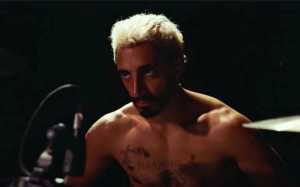 THE SOUND OF METAL: The story of a heavy metal drummer (“Rogue One’s” Riz Ahmed) who loses his hearing is specific in its setting but ultimately is a story of accepting the curveballs life throws at you. “Sound of Metal” makes you walk a mile in Ruben’s shoes. Applying immersive sound design, writer-director Darius Marder toggles between Ruben’s point-of-view and real-world sounds. The muffled sound of the world filtered through his damaged ears portray his sensory deprivation in an intense way. As his desperation and frustration grow the sound design hammers home the devastating effects of hearing loss.
THE SOUND OF METAL: The story of a heavy metal drummer (“Rogue One’s” Riz Ahmed) who loses his hearing is specific in its setting but ultimately is a story of accepting the curveballs life throws at you. “Sound of Metal” makes you walk a mile in Ruben’s shoes. Applying immersive sound design, writer-director Darius Marder toggles between Ruben’s point-of-view and real-world sounds. The muffled sound of the world filtered through his damaged ears portray his sensory deprivation in an intense way. As his desperation and frustration grow the sound design hammers home the devastating effects of hearing loss.
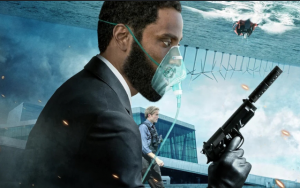 TENET: For blockbuster starved audiences Nolan delivers the kind of spectacle we’re used to seeing in the summer months. As per usual, he avoids CGI wherever possible in favor of practical effects. The results are eye-popping. The big set pieces—like an airplane driving through a building—don’t have the kind of digital disconnect that often comes with computer generated action. The show-stopping sequences are busy, exciting but most of all, organic, and the sense of peril (and pageantry) that comes with that is undeniable. Add to that Nolan’s use of IMAX cameras and you have wild action that fills the big screen in every way.
TENET: For blockbuster starved audiences Nolan delivers the kind of spectacle we’re used to seeing in the summer months. As per usual, he avoids CGI wherever possible in favor of practical effects. The results are eye-popping. The big set pieces—like an airplane driving through a building—don’t have the kind of digital disconnect that often comes with computer generated action. The show-stopping sequences are busy, exciting but most of all, organic, and the sense of peril (and pageantry) that comes with that is undeniable. Add to that Nolan’s use of IMAX cameras and you have wild action that fills the big screen in every way.
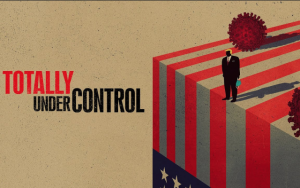 TOTALLY UNDER CONTROL: “Totally Under Control,” the title of the new Alex Gibney now on VOD, is a bad joke. Kind of like nicknaming a tall guy Tiny it’s an ironic, sarcastic comment on President Donald Trump’s repeated denial of the severity of the COVID-19 pandemic. Made in secret over the five months leading up to the U.S. Presidential Election, it features damning interviews with scientists, medical professionals and government insiders. It’s a haunting collection of facts that would be unbelievable if it wasn’t true. Gibney, Harutyunyan and Hillinger’s aim to expose “a system-wide collapse caused by a profound dereliction of Presidential leadership,” is methodical and urgent, digging behind the headlines to reveal a timeline that should be of concern to everyone reading this or watching the film. It is a difficult watch, not because it isn’t slickly made but because it an infuriating reminder of how we got into this situation.
TOTALLY UNDER CONTROL: “Totally Under Control,” the title of the new Alex Gibney now on VOD, is a bad joke. Kind of like nicknaming a tall guy Tiny it’s an ironic, sarcastic comment on President Donald Trump’s repeated denial of the severity of the COVID-19 pandemic. Made in secret over the five months leading up to the U.S. Presidential Election, it features damning interviews with scientists, medical professionals and government insiders. It’s a haunting collection of facts that would be unbelievable if it wasn’t true. Gibney, Harutyunyan and Hillinger’s aim to expose “a system-wide collapse caused by a profound dereliction of Presidential leadership,” is methodical and urgent, digging behind the headlines to reveal a timeline that should be of concern to everyone reading this or watching the film. It is a difficult watch, not because it isn’t slickly made but because it an infuriating reminder of how we got into this situation.
